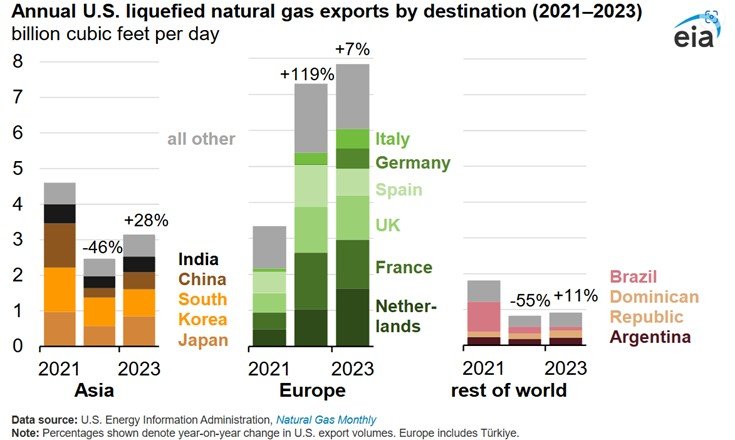NEW: Report Undermines Justification for President Biden’s LNG Pause
The API Federal Relations Team
Posted August 6, 2024
Heads Up: The Bill Gates-funded Breakthrough Institute has released a new report entitled “A Major Paper on Liquified Natural Gas Emissions Is Riddled with Errors.” It highlights fundamental issues with the methodology and academic fitness of research the Biden administration and the Department of Energy (DOE) use to justify their decision to freeze permits for new liquefied natural gas (LNG) projects.
Key Context: Research from Cornell University professor Robert Howarth is seen as the technical basis for the freeze. In the new report, the Breakthrough Institute found flaws across Howarth’s analysis of the lifecycle emissions of U.S. LNG.
An Energy Advantage America Should Keep: It is critical to restore the role of American energy in bolstering our geopolitical strength as wars rage in two of the world’s energy-producing regions. As part of our Five-Point Policy Roadmap, API supports fully and immediately lifting the administration’s LNG permitting pause — a move that would follow guidance in a district court’s recent injunction. It’s past time to approve all pending export applications languishing at DOE. This would signal that the U.S. remains the world’s go-to supplier of LNG, displacing higher-emitting fuels and supplying reliable energy to allies.

“Worse Than Coal” Claim Shot Down: Despite widespread prevalence of data showing clear environmental benefit, both Howarth and activist Bill McKibben insist exported U.S. LNG is “worse than coal.” Hence the manipulation of the faulty science that formed the basis of the Biden administration’s LNG pause earlier this year. From the Breakthrough Institute’s report: “That an activist scholar with a history of contested and critiqued claims could influence the Biden administration with such an obviously erroneous study is more than concerning. It demonstrates how faulty science in the name of climate can derail important policy debates and make the global energy transition far harder.”
The Flaws Detailed: Breakthrough Institute experts detailed obvious weaknesses with Howarth’s scientific approach. They showed that his conclusions are based on inaccurate and exaggerated “life cycle assessments” omitting recent data and peer-reviewed materials. The Breakthrough Institute contends Howarth’s analysis is “riddled with errors”:
- Flawed information on exactly where natural gas used to make LNG is produced.
- Incorrect data on whether emissions occurred in upstream or downstream operations.
- Incomplete or flawed data on emissions or leaks from the re-gasification process overseas.
- Mistaken LNG shipping distances.
- Faulty and pessimistic assumptions about the capacity and size of LNG shipping tankers.
Restricting American LNG a Likely Backward Step on Climate: In the long run, policymakers around the world will need to weigh the environmental and energy policy benefits of using LNG instead of coal in their respective economies. But restricting LNG supplies at their source in the U.S. – as the Biden administration is trying to do – does not translate into an effective decarbonization or climate strategy. In fact, the Breakthrough Institute notes the idea of LNG benefits is “empirical and straightforward.”

Bottom Line: Bad Methodology Shouldn’t Cloud LNG Progress & U.S. Energy Leadership: “When it comes to the carbon footprint of LNG,” concludes the Breakthrough Institute, “climate commentators have allowed flawed methodology to dominate the conversation for too long. … Howarth’s study [is] no basis upon which to make energy policy, and the Biden administration would do well to refer to higher-quality studies in the literature and experts at the DOE in developing a sound LNG export policy.”


